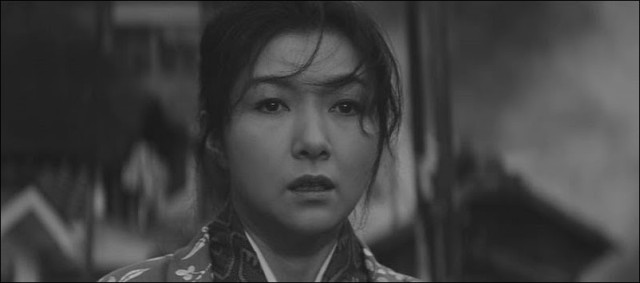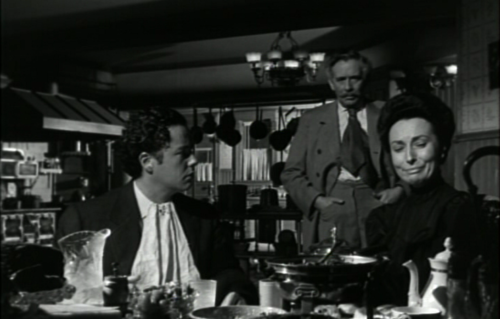Today’s Year is 1964.
Today’s Top Tier selection is Yearning (dir: Mikio Naruse)
 Of the director’s great films, perhaps the most crushing – Hideko Takamine’s futile dash that climaxes the story is not something you will soon forget – but what makes a Naruse film a Naruse film, especially here, is his delicate touch, his customary “light tragedy,” his concern for building social and familial context around his characters, and a landscape that seems both ephemeral and casually real. If you look at the above still, there’s a hint of how Naruse works in the framing and focus choices: surrounding Takamine is a total landscape of suburban housing, but held in a shimmering blur.
Of the director’s great films, perhaps the most crushing – Hideko Takamine’s futile dash that climaxes the story is not something you will soon forget – but what makes a Naruse film a Naruse film, especially here, is his delicate touch, his customary “light tragedy,” his concern for building social and familial context around his characters, and a landscape that seems both ephemeral and casually real. If you look at the above still, there’s a hint of how Naruse works in the framing and focus choices: surrounding Takamine is a total landscape of suburban housing, but held in a shimmering blur.
Like Yearning? We recommend:
- History is Made at Night (Frank Borzage, 1937)
- The Small Back Room (Michael Powell and Emeric Pressburger, 1949)
- The Clock (Vincente Minnelli, 1945)
- Make Way for Tomorrow (Leo McCarey, 1937)
- Brief Encounter (David Lean, 1945)
Today’s Netflix Instant recommendation is The Masque of the Red Death (Roger Corman, 1964)
 What’s most remarkable about Corman’s Poe adaptation (his seventh) isn’t just that he makes the most of a limited budget, which he most definitely does. What’s remarkable is that it often looks like he’s bringing it home under a much larger budget than he likely had – discipline in production on an entirely different scale. Red Death is downright glamorous, brilliantly colorful, handsomely framed in CinemaScope, but never overmuch. One thing that might give it away as a Euro-independent is its moral center – it hasn’t got one, unless you would call the story’s ultimate one-upsmanship on a very bad man a moral ending.
What’s most remarkable about Corman’s Poe adaptation (his seventh) isn’t just that he makes the most of a limited budget, which he most definitely does. What’s remarkable is that it often looks like he’s bringing it home under a much larger budget than he likely had – discipline in production on an entirely different scale. Red Death is downright glamorous, brilliantly colorful, handsomely framed in CinemaScope, but never overmuch. One thing that might give it away as a Euro-independent is its moral center – it hasn’t got one, unless you would call the story’s ultimate one-upsmanship on a very bad man a moral ending.
Like The Masque of the Red Death? We recommend:
- Hangmen Also Die! (Fritz Lang, 1943)
- Black Narcissus (Michael Powell and Emeric Pressburger, 1947)
- Youth of the Beast (Seijun Suzuki, 1963)
- The Taking of Power of Louis XIV (Roberto Rossellini, 1966)
- Week End (Jean-Luc Godard, 1967)
Today’s New York City repertory pick is The Magnificent Ambersons (dir: Orson Welles), which plays at Film Forum today at 4:10 PM
 One can’t help but to notice that Orson Welles’s greatest film – and, like only a few others, his career is top-heavy not just with great films but “greatest films” – is also his most tragically mishandled, infamously by RKO, never to recover. The RKO malignancies don’t aid the film, but there’s an almost tangible quality of “what might have been” that seems to elevate the film, as significantly as what’s actually there – an unrestrained whirligig of experimentation that is grounded in literary stock and the director’s own grave whisper. Welles’s films had a way of occupying an era as fully as the mighty actor would occupy the stage, from a quasi-prehistoric Macbeth to the baroque 1970s of The Other Side of the Wind; Ambersons was his rare incursion into Victorian and immediately post-Victorian eras. The desperate atmosphere, the sensation of time being extinguished, is utterly palpable.
One can’t help but to notice that Orson Welles’s greatest film – and, like only a few others, his career is top-heavy not just with great films but “greatest films” – is also his most tragically mishandled, infamously by RKO, never to recover. The RKO malignancies don’t aid the film, but there’s an almost tangible quality of “what might have been” that seems to elevate the film, as significantly as what’s actually there – an unrestrained whirligig of experimentation that is grounded in literary stock and the director’s own grave whisper. Welles’s films had a way of occupying an era as fully as the mighty actor would occupy the stage, from a quasi-prehistoric Macbeth to the baroque 1970s of The Other Side of the Wind; Ambersons was his rare incursion into Victorian and immediately post-Victorian eras. The desperate atmosphere, the sensation of time being extinguished, is utterly palpable.
Like The Magnificent Ambersons? We recommend:
- A Corner in Wheat (D.W. Griffith, 1909)
- L’argent (Robert Bresson, 1983)
- Chimes at Midnight (Orson Welles, 1965)
- Sans soleil (Chris Marker, 1982)
- Meet Me in St. Louis (Vincente Minnelli, 1944)
Want more film recommendations? @ thefilmsaurus on Twitter with a film you like, get five titles in return. Curated recommendations, at no cost.

